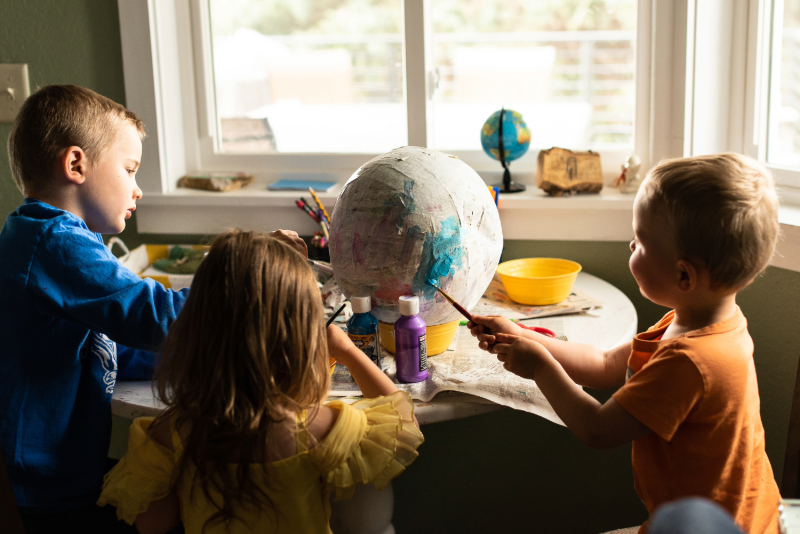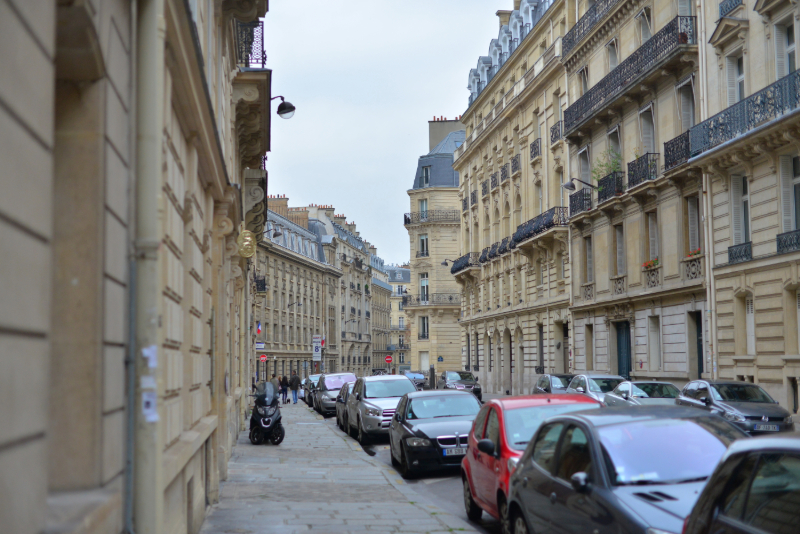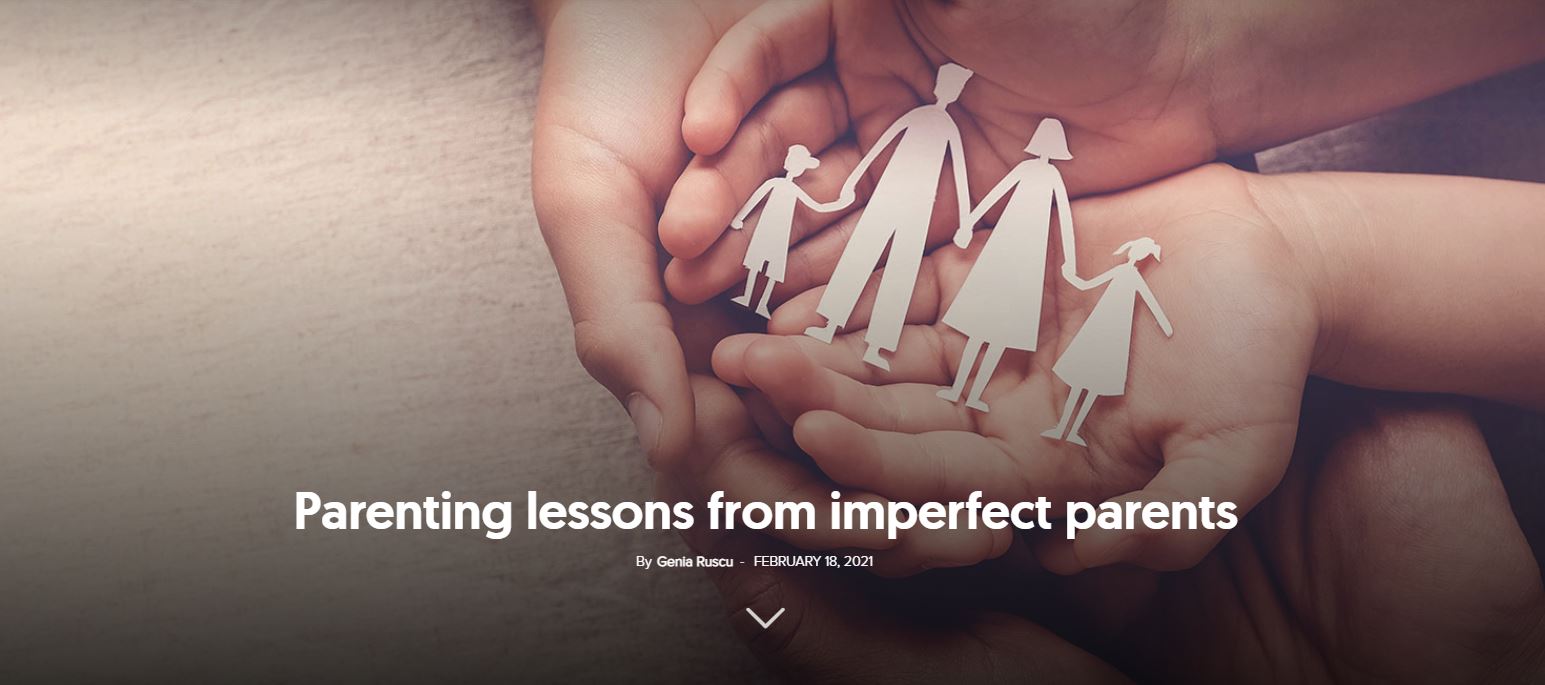I grew up on an unpaved, quaint side street in Ploiești, Romania. After school or during summer vacations my neighbours, M. and C., and I were an inseparable trio. We were almost always outdoors. If it wasn’t too hot or raining, you could find us in one of our backyards.
At M.’s house, we played shipwreck because she had a gazebo and lots of plants in her yard. At C.’s, we played with LEGOs because she had the most sets, and it was fascinating to create whatever we wanted from those beautiful pieces. At my house, we made tents from blankets draped over the clothesline and played pharmacy (using just the empty boxes because I was forbidden from playing with actual medicines, but nothing had been said about the boxes), school, and shop—using acacia leaves as money. We used vegetable crates to set up a small furniture arrangement, and when my mom came home with the delivery van and had lighter crates to unload, we’d lend a hand. Afterwards, we’d get a few coins to buy small Sando chocolates with peanuts or soft ice cream.
Sometimes we joined the older kids, about three or four years older than us, and got covered in dust playing soccer, castle, boogie man, tag, hide and seek, or poison bottle. We loved making paper cones and blowing them away. When the grapes were ripe, we used them as makeshift projectiles. One summer, a neighbour got upset with us for staining his fence with grape juice. We strung a rope across the street as a net and only took it down when a car passed by—which was rare.

We enjoyed crafting little boats from polystyrene with matchstick masts and string, launching them in puddles formed after a heavy rain. We sat on fences sipping nectar from honeysuckle flowers, telling stories, flipping through illustrated books or magazines, and making mud pies decorated with leaves and fruit peels.
We also did our homework (cramming it all in at the end of August), practised the piano, visited the county library to borrow books from the reading list, and by the end of the vacation, we returned to school with scrapes, tans, and a sack full of memories.
If one of us caught mumps, chickenpox, or another childhood illness and had to be isolated for several weeks, the two of us who remained “free” would write letters and attach drawings, placing them in the mailbox of the sick friend. The patient would then send a reply in the same manner, using an older sibling or a parent as the postman. That’s how it was in the years ‘90–‘95.
How it is now
Now, nearly 30 years later, the scene has changed. We still live on a side street, but we can’t walk on the sidewalk because of the parked cars. Playing on the street? Out of the question; it’s too dangerous. We greet and briefly chat with neighbours only when we occasionally bump into them. There’s no time for long conversations at the gate anymore. I’m referring to the urban environment, a big city.

My daughter is now five years old, but I also observe other school-aged children and their schedules: lots of homework, extracurricular activities, summer camps, or packed programs to ensure parents can work and know their children are safe. Screens are often a solution for peace and knowing the child is close by. On the other hand, screens become a coping mechanism for children, offering refuge in the virtual world when emotions become overwhelming. It’s similar to compulsive eating or other behaviours.
Some children find it hard to detach from screens. They no longer want to go outside. They have no one to play with since their peers are playing online. During the school year, some children barely have time to breathe. Their days are filled with school, then afterschool homework, followed by various extracurricular activities, and they come home exhausted.
Extracurricular activities without options
I once taught extracurricular activities in schools and kindergartens and noticed restless children who wanted to go outside and play freely, rather than stay indoors for painting, clay modelling, or drawing with ink. They would tell me they were already tired and needed to finish quickly because they had swimming or basketball afterwards. Many of them didn’t enjoy the activities but participated because “mom signed me up and paid for it so I have to participate.” They would rush through their tasks just to fill the paper and then wanted to join their friends outside who weren’t enrolled in any activities. I had to find ways to engage them until the end of the session.
I wonder how many children actually want to participate in these activities and do so with joy, compared to those who are merely fulfilling their parents’ unmet desires, accumulating frustration. How many parents organise their child’s free time based on the principle of “I didn’t have this when I was young and I wanted it”? Or parents who spend weekends at competitions, posting photos for a simple reason: “Look at all the diplomas and medals my kid has collected; let’s get some likes to boost my ego”?
What we lost
It seems that, especially in urban areas, we’ve lost the joy of free play on the streets and the sense of security that came from a neighbourhood where everyone watched over each other’s children. We’ve lost the simplicity of life back then—a simplicity born more out of necessity than choice, as we didn’t have many options. Creativity was at its peak, as we turned everyday objects into toys and found all sorts of inventive solutions.
Today, it feels like more and more children are becoming sedentary, exercising only their finger muscles as they race across keyboards and game consoles. This “virtual sport” is often paired with a diet heavy in junk food. There is a pressing need for educational programs that make sports and healthy eating appealing to children. Of course, this isn’t the case everywhere. I know there are children who don’t fit into these categories.
What we have gained
When I was young, new books were a rarity. My father would occasionally bring back Christian books from the Stephanus bookstore in Bucharest, which I would read repeatedly. Nowadays, we have an abundance of books—both secular and Christian. I read to my child daily, and most of the books (carefully chosen) evoke emotions in me as an adult, often giving me new ideas to ponder.
We are fortunate to have an abundance of educational programs in cultural institutions and beyond, supported by both the state and private initiatives. Many museums have learned to be child-friendly, and there are interactive exhibitions, experiment houses, educational concerts, and musicals designed for young audiences. These experiences leave us richer than before.
There’s also a wide array of materials available for arts, crafts, and hobbies, along with countless free online tutorials that teach children how to create a multitude of things in their free time.

Boredom
Yet, despite this abundance, there is still a lot of boredom during free time. Boredom can be beneficial. Let children be bored so they can become creative. However, sometimes “I’m bored” translates to “I feel lonely.” It can mean, “I want you to play with me, Mom, because I need connection. I need to be seen. I need you to treat me like your phone, to react at the slightest notification from my side and give me your attention.” Other times, it means, “I want to spend our free time together, Dad, because I need your hug. I need to learn from you and feel more competent, to feel in control.”
A few ideas
Here are a few thoughts on choosing activities for children’s free time:
- Make sure the activities bring them joy.
- Select activities that promote their overall development—physically, mentally, emotionally, and spiritually. I’ve observed children who are highly developed cognitively but struggle to handle minor frustrations.
- Avoid overloading their schedules so they can still have time for free play.
A call for balance
There is much more to discuss. This text only touches on a few points. In my work, both in the children’s show I produce for Hope Channel Romania (a program where I provide ideas for children’s free time to kids and parents) and as a mother regarding my own child’s free time, I strive to follow the path of balance. I don’t believe in universal formulas. Each parent must decide what is best for their child. I don’t think now is worse than then, or vice versa.
I believe we are blessed with an abundance of choices. We should avoid putting pressure on ourselves or our children, focusing instead on living beautifully and growing together.
As it is written in the Bible about Jesus in His childhood: “And Jesus grew in wisdom and stature, and in favor with God and man” (Luke 2:52).
Mioara Mihai hosts the show “Căsuţa cu idei” (The ideas house) on Speranţa TV (Hope Channel Romania). She graduated from the National University of Arts and has developed and implemented various educational, recreational, and creative programs for children over the years.




















